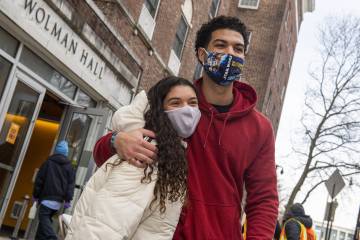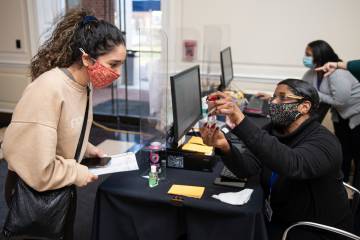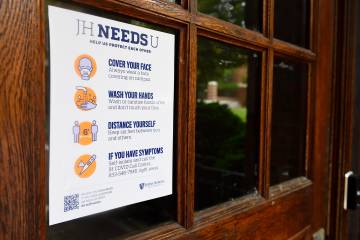As Johns Hopkins prepares to ramp up on-campus activities in the coming days, it's calling on all members of the Hopkins community to remain cognizant and committed to following basic public health precautions designed to keep themselves and others safe and healthy amid the COVID-19 pandemic.
The JHU Social Compact, created by and for Hopkins students, faculty, and staff, asks everyone to monitor their health and report symptoms, wear appropriate face coverings and maintain physical distance, wash and/or sanitize hands frequently, participate in required asymptomatic testing and contact tracing, and use the Prodensity app or website daily before coming to campus.
"As a member of the Johns Hopkins community, I commit to do my part to protect my physical and mental health and well-being and that of my fellow students, faculty, and staff," the JHU Social Compact begins. "I affirm the need to follow the best practices identified by our Johns Hopkins experts and their colleagues to stem the spread of this pandemic, no matter where I am in the world."
Members of the Hopkins community are encouraged to show their support and solidarity by reading and sharing the full pledge at https://covidinfo.jhu.edu/compact.
"With this highly contagious virus, and with more people on our campuses now than at any time since late March, we need every member of our community to follow public health guidance to protect each other and stop the spread of COVID-19 in our community," said Alanna Shanahan, vice provost for student affairs and one of the leaders of the JHU Social Compact effort. "This only works if everyone commits to do these things—you hear it all the time, but we truly are all in this together."
The idea for a communitywide compact began taking shape over the summer among a group of Hopkins students. As university leaders contemplated a fall return, members of the Student Advisory Committee on Return to Campus—made up of 20 students representing all nine JHU academic divisions—recognized that there was no single, unifying document that outlined best public health practices and asked students to hold themselves to those standards.
Their conversations gave rise to the Student Compact, a voluntary pledge launched in the fall and shared and signed by more than 1,100 students, and ultimately the universitywide JHU Social Compact based on feedback demonstrating a collective desire for students, faculty, and staff to commit to following the same safety practices.
"We all have an obligation to protect each other and to protect the vulnerable members of our community," said Sam Mollin, a senior political science major who serves on the student advisory committee and is also president of the Johns Hopkins Student Government Association. "And so we wanted to have a compact that was inclusive for everyone, to make sure that everybody was involved in the effort to make sure that we weren't creating a situation where we were putting our peers or the larger Baltimore community at risk."
That message—and the simple actions that minimize risk—will be especially important as the university welcomes students for in-person instruction next week for the first time in more than 10 months.
"We have been planning for this moment for nearly a year," said Lanise Stevenson, a doctoral degree candidate at the JHU School of Education and, like Mollin, a member of both the student advisory group and the social compact subcommittee. "No stones were left unturned. We considered every stakeholder group, truly. … The university has taken every precaution to ensure that students, faculty, and staff receive the support, resources, and space they need to accomplish their daily tasks."
Mollin, who lived in Baltimore during the fall semester and recently returned for the spring semester, said that for the most part, students and others he sees on the university's Homewood campus are following safety protocols. But, he adds, there's certainly room for improvement, and he hopes increased visibility for the JHU Social Compact—as well as other messages and awareness efforts that are part of the JHNeedsU public safety campaign—will lead to even greater compliance across the Hopkins community.
"I think you need the positive obligation, the feeling that we're all part of one community and we have a duty to keep each other safe," Mollin said. "Because we all want to be back on campus—I don't think there's a single undergraduate who would not like to be on campus. But in order to do that successfully, we need to have a positive sense that we're one community that needs to protect each other."
Added Stevenson: "The next few months will not be easy, but we are well-prepared for any unforeseen events that may arise. I am confident about that."
Posted in University News, Student Life










